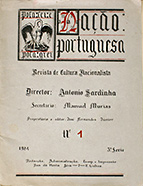

................................
The first edition of Nação Portuguesa set out its objectives: to present and explain the solution of a nationalist state (José Augusto Vaz Pinto, "Da essência e dos limites do Nacionalismo Português " [Regarding the essence and limits of Portuguese nationalism], IV series, 1927) and monarchy; to revive tradition ("Anunciação" [Annunciation], no. 1, April 1914) and to fight the democratic and liberal Portuguese Republic in its "form of representative government" (no. 1, April 1914). In the second edition, the aim was to promote a "restoration of Intelligence" (" Porque voltámos " [Why we have returned], no. 1, 1922) in order to rebuild the "moral physiognomy of Nationality" (" Porque voltámos ," no. 1, 1922) in line with the heritage of past generations and the "sacred stimuli" that would open the "mysterious doors to the Future" (" Porque voltámos ", no. 1, 1922), as well as recording the upward march of the "great political and social movements," such as Fascism ( Rolão Preto, "Crónica social" [Social Chronic], no. 1, 1924). The aim of the 3rd series was to restore value and give the word crisis its proper place and meaning; to present the Portuguese situation at the time, since there was a complete denial of its most intimate historical reasons ("Adiante, por sobre os cadáveres !", no. 1, 1924) because of the crisis; and to set out the factors behind the crisis in Europe at the time, which was supposedly threatened and perhaps irreparably plunged into "Mongol anarchy" in the face of the "Christian order" ("Adiante, por sobre os cadáveres !", no. 1, 1924). It was concluded that the Portuguese situation was not at all isolated from the European issue and that any crisis that Portugal might be going through would be the same as that of Western civilisation ("Adiante, por sobre os cadáveres !" [Forward, over the dead bodies!] no. 1, 1924). Regarding the 4th series of the magazine Nação Portuguesa , the aim was to find the truth according to the legacy of the thought of António Sardinha: that of the complete, definitive victory of a way of thinking that called for the idea of reorganising the nationalist, monarchical, and organic state through intelligence (Manuel Múrias , " Vigília de Armas" [Weapons Vigil], series IV, 1926). In the 5th series, the focus was on the idea of a nationality in crisis, the antidote of which would be tradition, so that Portugal could return "to the possession of its immortal destinies" (António Sardinha, " Pratiquemos um acto de Inteligência " [Let's practice an act of intelligence], series V, 1929). The guiding idea would then lead Portugal to nationalism based on "two natural elements-land and race". Therefore, the renewal of nationality would be conditioned by the return of Portugal to its guiding idea. This would also involve a renewal of literature, which would come into close contact with the land and the race.
This work is financed by national funds through FCT - Foundation for Science and Technology, I.P, in the scope of the projects UIDB/04311/2020 and UIDP/04311/2020.
